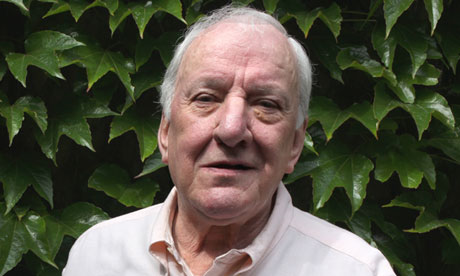Composer Sir Richard Rodney Bennett dies aged 76

Sir Richard Rodney Bennett, one of Britain’s most versatile and talented composers and performers, has died peacefully on Christmas Eve in his adopted home city of New York, aged 76.
Over the course of a distinguished career he has been equally at home writing music for the concert hall and performing cabaret at the Algonquin Hotel; as enthusiastic about Cole Porter as Pierre Boulez. His publisher, Gill Graham of the Music Sales Group, said: “He was, I think, the last of his kind. He wrote 32-bar jazz standards, the most complex serial music, and everything in between.”
To a broad audience he is perhaps best known as a prolific writer of scores for film and television, including for Sidney Lumet’s Murder on the Orient Express and Four Weddings and a Funeral; his film work earned him two Oscar nominations. To his friends he will be remembered as a witty and generous host, a fiendish player of Scrabble and an enthusiastic creator of delicious Christmas feasts. Graham described him as “determined, hilarious and a great influence”.
Bennett was born in 1936 and raised in Budleigh Salterton, Devon. His mother had studied composition with Gustav Holst; his father was a writer of children’s books. In 1953 he turned down a place at Oxford to study at the Royal Academy of Music in London, part of a golden generation of British composers including Sir Peter Maxwell Davies, Thea Musgrave, Cornelius Cardew and Sir Harrison Birtwistle. He told the Guardian last year: “In fact for me the academy was a disaster. I learned much more in the Westminster music library in Buckingham Palace Road, which was an absolute treasure house of 20th-century music. But London was very exciting. It was cheap and we could live our own lives and be slightly raffish without exactly being bohemian.”
Bennett was one of only very few composers to study personally with Boulez, in Paris from 1957-8. He also visited the Darmstadt summer school. These were the twin citadels of 12-tone serial composition, and the rigorous attitude among many of the “serious” composers of the time was to discount music written outside its strictures.
All along, though, Bennett was writing music for the screen in popular idioms “to earn money to subsidise my other work. But I liked writing music that would be played next week by brilliant musicians. It was the best training there was,” he said. As a student he also supported himself as a jazz musician and later began to perform regularly with Cleo Laine. He is regarded as having been one of the most accomplished jazz pianists of his generation.
Major works include three symphonies and an opera, The Mines of Sulphur. There were concertos for various instruments and concertante pieces including his Actaeon for orchestra and solo horn, and his Sonnets to Orpheus for orchestra and solo cello.
Finally, all these disparate parts of his musical life were reconciled, aided by a move to New York in 1979. A more relaxed style emerged, with music for the concert hall inflected with flavours of the jazz and film music that he loved. A 1990 concerto for saxophone fused jazz harmonies and serial technique; recent works have included Reflections on a Scottish Folk Song for cello and string orchestra commissioned by Prince Charles to honour the memory of the Queen Mother.
The critic Tom Service wrote earlier this year: “In his reflection of so many of the streams, trends and styles of postwar music, and in the unmistakable, personal voice he has found across all of the genres in which he has worked, composed and performed, Bennett is one of the most significant compositional voices we have.”
Although the sheer variety of his output means that he has, perhaps, been undervalued, his delight in so many genres and styles has, arguably, prefigured the eclectic musical approach of a younger generation of composers such as Mark-Anthony Turnage and Thomas Adès.
Chris Butler, head of publishing for the Music Sales Group, which owns Chester and Novello, said: “Richard was the most complete musician of his generation – lavishly gifted as a composer, performer and entertainer in a multiplicity of styles and genres. He was a loyal friend to music, musicians and music publishing and we will remember him with great respect and affection.”
Source: The Guardian


